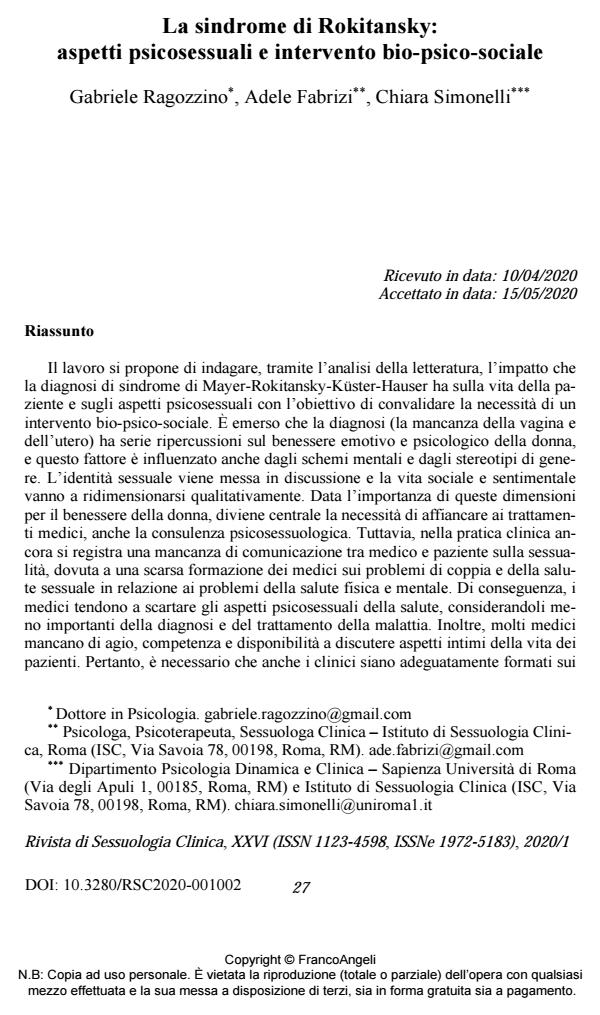Rokitansky syndrome: psychosexual aspects and bio-psycho-social intervention
Journal title RIVISTA DI SESSUOLOGIA CLINICA
Author/s Gabriele Ragozzino, Adele Fabrizi, Chiara Simonelli
Publishing Year 2020 Issue 2020/1
Language Italian Pages 15 P. 27-41 File size 238 KB
DOI 10.3280/RSC2020-001002
DOI is like a bar code for intellectual property: to have more infomation
click here
Below, you can see the article first page
If you want to buy this article in PDF format, you can do it, following the instructions to buy download credits

FrancoAngeli is member of Publishers International Linking Association, Inc (PILA), a not-for-profit association which run the CrossRef service enabling links to and from online scholarly content.
Mayer-Rokitansky-Küster-Hauser syndrome is a rare congenital malformation that affects one in five thousand women. It is characterized by the lack (agenesis) of the vagina and uterus, but without alteration of the ovaries, external genitalia, secondary sexual characteristics and karyotype. This article aims to investigate, through literature analysis, the impact that the diagnosis of Mayer-Rokitansky-Küster-Hauser syndrome has on the patient’s life and psychosexual aspects with the aim of validating the need for bio-psycho-social intervention. The diagnosis is almost always made very late, often during adolescence due to the lack of menarche. Besides the problems in the psychic and sexual sphere, the most debilitating aspect of the syndrome is infertility due to the absence of the uterine canal. From the diagnosis the self image that is reformulated is extremely negative, the girl feels defective, imperfect, and this consideration of herself is strongly linked to the symbolic representation of the uterus as a sign of femininity. Her gender identity, as the unitary and persistent perception of oneself as belonging to the male or female gender, is also questioned. The Rokitansky syndrome also has repercussions on the quality of romantic and sexual relationships. Women with vaginal agenesis tend to avoid being involved in romantic and sexual relationships, as their clinical situation may become a problem due to the fear of having to inform their partner of the diagnosis, the resulting infertility and the fear of not being able to satisfy him sexually. The issue of infertility is often linked to a loss of physical attraction and trust between partners. The inability to conceive a child can lead to a distortion of the psychological balance of both the individual and the couple and is compared to grief. Studies of infertile women reveal an increase in suspicion and hostility that can affect the relationship with the partner. There are different medical and surgical solutions to deal with this condition. However, medical intervention alone does not seem to be sufficient to pursue the well-being of the patient. Rokitansky syndrome has an enormous impact on the sexual life of patients even after treatment because often the coital relationship is painful (dyspareunia) and difficult both because of the small size of the vaginal canal and the poor lubrication that women complain about. The studies also report the importance of the affective dimension in the sexual satisfaction of the couple. In addition, the reactions of the family and the environment are an additional emotional issue that increases the adolescent’s distress. It is therefore advisable to also take care of the emotional needs of the parents and respond to their information needs because the family provides the context that shapes the way patients experience the disease and communicate their experiences. It is therefore essential to use an integrated approach that provides both medical intervention and psychosexual counselling at the same time. As various research shows, patients express a desire to talk about their feelings and sexuality in a respectful and welcoming atmosphere. For this reason, they should always be at the centre of treatment and therapy and should be able to play an active role in the decision-making process. However, in clinical practice there is still a lack of communication between doctor and patient about sexuality, due to a lack of training of doctors on couple and sexual health problems in relation to physical and mental health problems. As a result, doctors tend to discard the psychosexual aspects of health, considering them less important than the diagnosis and treatment of the disease. In addition, many doctors lack comfort, competence and willingness to discuss intimate aspects of patients’ lives. Therefore, it is necessary that clinicians are also adequately trained on psychological and sexual health problems in order to develop a greater sensitivity to these issues and, above all, to recognize the importance of the bio-psycho-social model and, therefore, to show a greater spirit of collaboration in teamwork.
Keywords: Mayer-Rokitansky-Küster-Hauser syndrome, vaginal agenesis, sexual identity, gender identity, bio-psycho-social approach
Gabriele Ragozzino, Adele Fabrizi, Chiara Simonelli, La sindrome di Rokitansky: aspetti psicosessuali e intervento bio-psico-sociale in "RIVISTA DI SESSUOLOGIA CLINICA" 1/2020, pp 27-41, DOI: 10.3280/RSC2020-001002